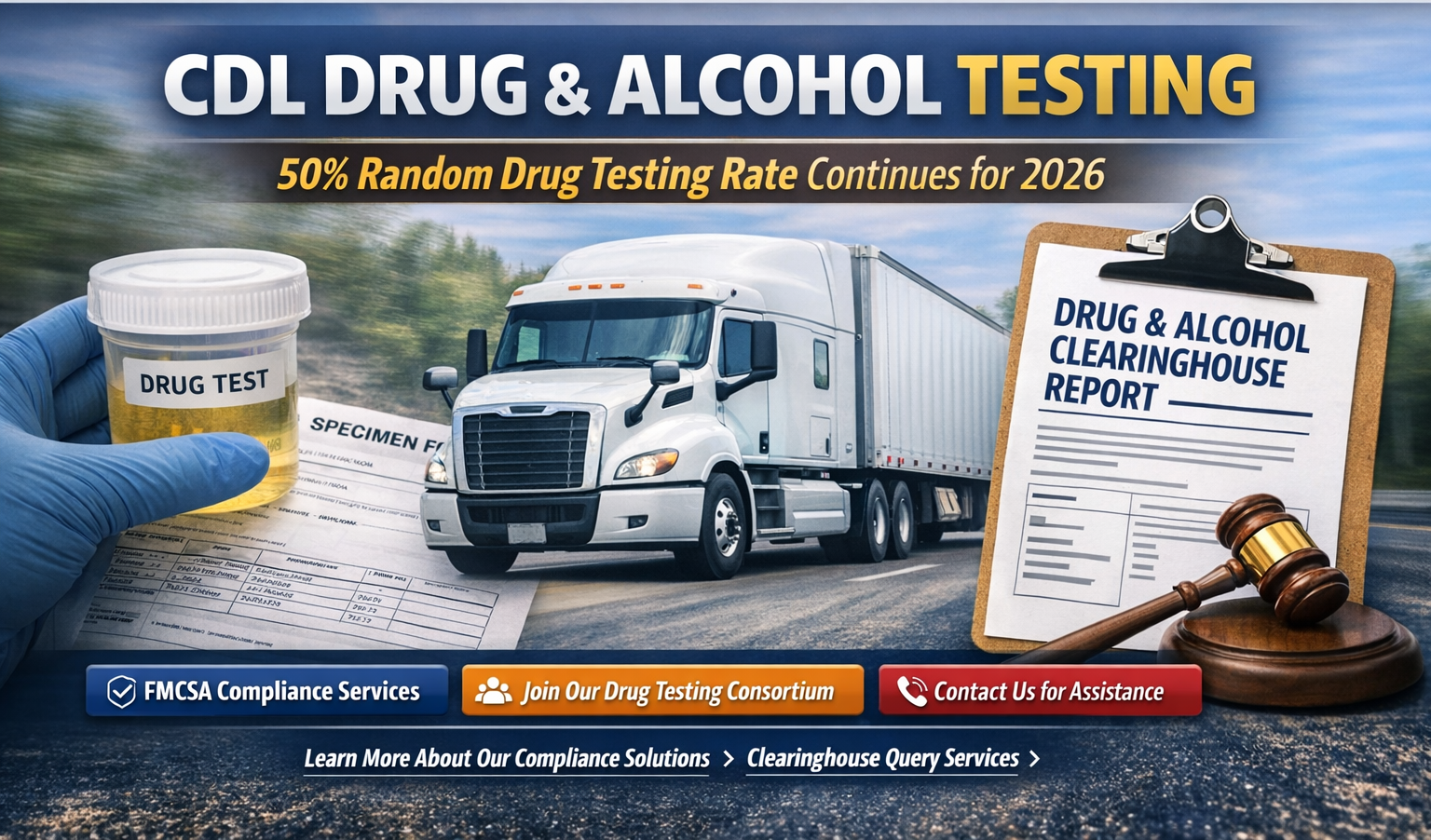Everything You Need to Know About DOT Driver Qualifications
June 18, 2025
Share this article:
What Are DOT Driver Qualifications?
The Department of Transportation (DOT) sets federal guidelines that all commercial drivers must meet before operating a commercial motor vehicle (CMV). These are known as DOT driver qualifications and are enforced by the Federal Motor Carrier Safety Administration (FMCSA).
DOT driver qualifications (DQF) confirm that drivers are medically, physically, and legally capable of safely operating a CMV. The standards include specific requirements related to health, driving history, licensing, and legal eligibility. Motor carriers are responsible for verifying that each driver meets these qualifications before assigning them to operate a vehicle.
Compliance with DOT driver qualifications is essential. Failure to follow these regulations can lead to fines, operational disruptions, and increased liability. Verifying driver qualifications helps protect the company’s reputation and promotes the safety of everyone on the road.
Minimum Requirements to Become a Qualified Commercial Driver
To meet DOT driver qualifications, individuals must satisfy a core set of requirements before they can operate a commercial motor vehicle. These standards are in place to ensure that a driver is physically fit, properly licensed, and capable of handling the responsibilities of commercial driving.
Meeting these minimum requirements is the first step toward achieving full compliance with DOT driver qualifications. Proper verification of each driver’s eligibility helps reduce risk and keeps the company audit-ready.
- Age: Drivers must be at least 21 years old to operate a commercial vehicle across state lines or transport hazardous materials.
- Language Proficiency: Drivers must be able to read and speak English well enough to understand road signs, respond to official inquiries, and complete required reports.
- Licensing: A valid Commercial Driver’s License (CDL) appropriate for the type of vehicle being operated is required.
- Experience and Driving Record: Drivers must have a clean driving record free of major violations such as DUIs or reckless driving. They must also have experience appropriate to the vehicle and type of operation.
- Medical Qualifications: Drivers must pass a DOT physical exam conducted by a certified medical examiner and maintain a valid Medical Examiner’s Certificate (MEC).
DOT Physical Exam and Medical Certificate
A critical part of DOT driver qualifications is the DOT physical exam. This examination confirms that a driver is medically fit to operate a commercial motor vehicle. It must be performed by a medical professional listed on the FMCSA National Registry of Certified Medical Examiners.
During the exam, the medical examiner evaluates a driver's overall physical health, including:
- Vision and hearing capabilities
- Blood pressure and pulse rate
- Urinalysis to detect underlying medical conditions
- Cardiovascular, neurological, and musculoskeletal health
If the driver meets the medical standards, they are issued a Medical Examiner’s Certificate (MEC), also known as a DOT medical card. This certificate is valid for up to 24 months, although drivers with certain medical conditions may receive a certificate with a shorter validity period.
Maintaining a current MEC is required to satisfy DOT driver qualifications. Drivers must carry the certificate with them and provide a copy to their employer. Fleet managers are responsible for keeping track of certificate expiration dates to prevent lapses in compliance.
The Importance of a Valid Commercial Driver’s License (CDL)
A valid Commercial Driver’s License (CDL) is one of the core components of DOT driver qualifications. It certifies that a driver has the necessary skills, knowledge, and training to operate a specific class of commercial motor vehicle safely.
There are three primary CDL classes:
- Class A: Required for operating vehicles with a combined weight of 26,001 pounds or more, including towed units over 10,000 pounds.
- Class B: Required for single vehicles with a weight of 26,001 pounds or more, or a vehicle towing another not exceeding 10,000 pounds.
- Class C: Required for vehicles designed to transport 16 or more passengers or hazardous materials.
Each CDL class has its own set of endorsements that drivers may need, depending on the type of cargo they transport or the vehicle they operate, such as tankers, hazardous materials (HazMat), or passenger vehicles.
Maintaining a valid, properly classified CDL is essential for compliance and helps prevent disqualifications that could impact fleet operations.

Ongoing Responsibilities: Driver Qualification Files and Recordkeeping
DOT driver qualifications require ongoing management. Motor carriers must maintain a Driver Qualification File (DQF) for each commercial driver. These files demonstrate compliance with federal regulations and must be ready for review during audits or inspections.
- Employment application and driving history
- Copy of the Commercial Driver’s License (CDL)
- Motor Vehicle Record (MVR) from each state where the driver is licensed
- Medical Examiner’s Certificate (MEC)
- Annual MVR review and certification of violations
- Road test certificate or equivalent documentation
Disqualifying Factors and How to Stay Eligible

Drivers can lose their qualification if they violate certain DOT regulations. Understanding these disqualifying factors helps prevent interruptions and keeps fleets running smoothly.
Common disqualifications include:
- Driving under the influence of drugs or alcohol
- Refusing alcohol or controlled substance testing
- Leaving the scene of an accident
- Using a commercial vehicle to commit a felony
- Serious traffic violations like reckless driving or excessive speeding
- Having a suspended or revoked CDL
- Expired MEC or invalid license
How to Maintain Compliance with DOT Driver Qualification Standards
Maintaining compliance with DOT driver qualifications takes ongoing work. Carriers must manage Driver Qualification Files, track CDL and MEC expiration dates, and review Motor Vehicle Records each year. Keeping driving histories and certifications up to date helps prevent disqualifications and avoid violations.
Training drivers on DOT regulations also supports long-term compliance. Many fleets use management software to automate recordkeeping and stay ahead of deadlines.
National Fleet Services provides expert compliance support and a DOT-focused platform built to keep your fleet audit-ready. Contact us today to learn how we can help you stay compliant and reduce risk.
fleet insights






